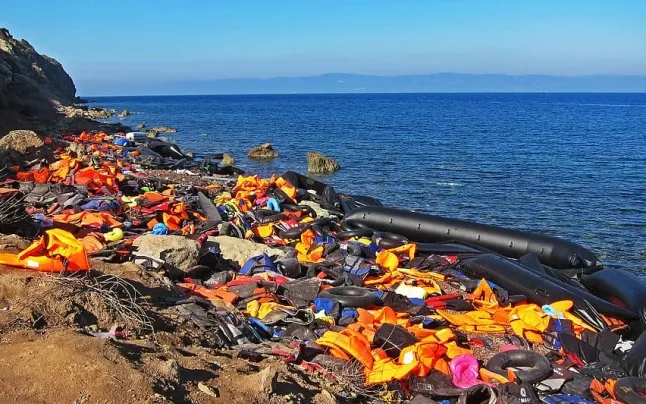The migration drama, in figures: nearly a thousand people dead on routes to Spain in six months
The report 'Monitoring Right to Life', by Walking Borders, confirms the increase in the deadly capacity of migration routes, especially the Canary route, during the first semester of 2023.
"Killing and letting die is the basis of border policy in Europe", asserts Helena Maleno, coordinator of Walkig Borders. And these are not just words, they are facts. This is evident in the new report presented by the organization, which once again reveals shocking figures: 951 people died on the Western Euro-African Border during the first half of 2023.
This is one of the data presented in the document 'Monitoring the Right to Life', regularly published by Walkig Borders, which highlights the unsustainable situation impacting the most fundamental right of individuals: the right to life. The study focuses on the period from January to June 2023, and the obtained data comes from primary sources compared with official sources, migrant communities, and social organizations working on the ground.
Walkig Borders questions the Spanish government's assertion that migrant arrivals decreased globally during the first half of the year - around 4%, according to the Ministry of the Interior - in access routes to Spain, especially the Canary route. The report clearly shows that the death toll during this period is similar to the previous year.
"We can affirm that on migration routes, especially the Canary route, the deadly capacity was increased, linked to the effective denial of migrants' right to life has increased", they explain, while noting an increase in deaths due to "policies related to migratory control, rather than those linked to physical difficulties and risks on the same routes". This statement is supported by the investigation of forty-nine tragedies that occurred on the routes of the Strait, Algerian, Alboran, and Canary Islands.
An average of five deaths per day on the Western Euro-African Border
All this work by the organization results in a series of key data that give an idea of the extent of the death policies that have been implemented at the borders for a long time. According to the Human Rights Observatory at the entity, 951 deaths were recorded in the Western Euro-African Border during the first half of the year, which means an average of five deaths per day.
According to the documented data, the vast majority occurred on the Canary route (778), in twenty-eight shipwrecks; followed by the Algerian route (102), in eight documented tragedies; the Strait route (50), in eleven known tragedies; and the Alboran route (21), in two tragedies.
The report highlights the months of February and June as the ones with the highest number of fatalities, with 237 and 332 respectively. Among the total number of people who lost their lives while attempting to reach Spanish coasts, 112 were women, and 49 were children.
The analysis also specifies that the nearly one thousand people who died came from fourteen countries: Algeria, Cameroon, Ivory Coast, Gambia, Ethiopia, Guinea Conakry, Comoros Islands, Mali, Morocco, Democratic Republic of Congo, Senegal, Syria, Sri Lanka, and Sudan. Additionally, during this time, a total of nineteen boats disappeared with all the people on board.
"We haven't had any news from her for many days, and we are very worried [...] I do everything I can to look for her, to try to find out something and have news from her, but we don't know how or where to search", says A.J., a friend of relatives searching for one of the missing persons, as an example of one of the poignant testimonies collected in the report.
Denouncement of migration control policies and rights violations to victims
Once the extent of the tragedy is known in figures, Walkig Borders' study goes further and focuses on the causes, mainly linked to the migration control policies of states, which have increased mortality rates on the routes to access Spain.
In this regard, the organization points out the failure to provide assistance, the delay in activating search and rescue resources, the clear inadequacy of the means used, the misconduct during rescues, and the lack of coordination between Spain and Morocco, two countries that have conducted their relations according to geopolitical interests that have prioritized migration control over the fundamental right to life.
As an example, following a complaint from Walkig Borders, the Prosecutor's Office of the Canary Islands recently filed a report with the courts of Las Palmas regarding the sinking of a Zodiac-type boat off the southern coast of the island on June 21, after waiting for rescue for ten hours, resulting in at least thirty-six people dead. The Prosecutor's Office is investigating the incident under suspicion of a crime of failure to provide assistance.
The criticisms of the NGO also focus on the violation of the human rights of the victims and their families. It is denounced that the survivors of shipwrecks have suffered detentions, forced displacements, physical attacks, and retentions under the application of immigration law.
"They started shooting when we were in the Zodiac, and I fell into the water [...] We were still close to the beach, I don't know how I survived", a witness collected by the entity from a survivor who was able to board a rubber boat that arrived in the south of Gran Canaria in May 2023.
Likewise, the organization highlights that the missing victims face denial of the right to be searched for, and their bodies have been found buried in mass graves without identification protocols with minimal guarantees and without dignified and respectful burials according to their beliefs.
Thus, the NGO notes that in these cases, human rights protocols are not applied by the authorities responsible for identifications. There are no transnational protocols that offer a quick response to families so that they can access the truth and begin the grieving process. Spanish search and rescue authorities continue to apply a "racist bias" in resolving these tragedies.
Moving towards repair and justice
Faced with this scenario, Walkig Borders emphasizes the urgent need to move towards repair and justice.
Essentially, the right to life of migrant people must take precedence over migration control policies. This implies applying protocols for assisting victims of tragedies and respecting the rights of survivors. It means not making any political decisions regarding border control that result in human rights violations. Improving search and rescue systems, as well as transnational coordination in the identification processes, is also essential. Cases of violation of the right to life at the borders should be investigated, and those responsible should be held accountable if necessary.
"The policies of death have been in place at the border for a long time, but we also detect an increase in impunity in the face of rising mortality rates, leaving victims and their families without access to repair and justice", says Helena Maleno. She values the work presented in the report as "part of the process of reconstructing memory and a tool to continue fighting for borders to no longer be spaces without rights".









Add new comment